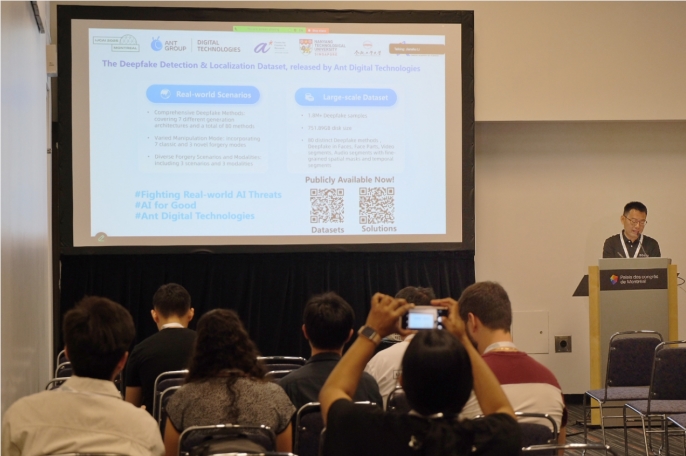Recently, during the International Joint Conference on Artificial Intelligence (IJCAI) held in Montreal, Canada, Ant Data and the Agency for Science, Technology and Research (A*STAR) of Singapore jointly hosted a workshop titled "Deepfake Detection, Localization, and Explainability." At the event, Ant Data and Stanford University jointly open-sourced two deepfake datasets, covering various modalities such as human face and action forgery, voice cloning, providing key foundational data resources for the industry and promoting the development of AI security technologies.
The workshop focused on Deepfake (deepfake) recognition. Scholars and industry experts from renowned institutions in China, the United States, Australia, Brazil, Singapore, and other countries shared their cutting-edge technologies and application achievements.
Ant Data's 1.8 million training dataset (DDL-Datasets) used for the IJCAI "Deepfake Detection Challenge" has been officially open-sourced to global researchers. This dataset includes three high-risk scenarios: face forgery, video tampering, and voice cloning, covering more than 80 forgery methods. It clearly marks the visual location and time points of AI-generated fake content, which helps improve algorithmic explainability. Researchers can download it from Modelscope (Moba Community).

Figure: Li Jianshu, Ant Data's international algorithm director, shares the deepfake localization dataset
The video dataset DeepAction, jointly open-sourced by Stanford University, Google, and the University of California, Berkeley, contains 2,600 human action videos generated by seven large models, along with matching real footage. These videos demonstrate daily behaviors such as walking, running, and cooking. Researchers can download them from Hugging Face (Hugging Face Community). In addition, the research team's paper "AI-Generated Human Action Detection" (Human Action CLIPs: Detecting AI-Generated Human Motion) won the best paper award at this workshop. The paper proposes a multi-modal semantic embedding-based identification technology that can accurately distinguish between real human actions and AI-generated actions. This method is highly robust and can effectively resist interference from data tampering techniques (such as adjusting resolution, compressing videos, etc.) against detection algorithms.
Professor Abhinav Dhall from Monash University in Australia shared his research team's findings using electroencephalogram (EEG) data: people from different cultural backgrounds show perceptual differences in AI-fake videos. When the video language is English, which participants are familiar with, and the actors come from similar racial backgrounds, their performance in distinguishing real videos from deepfakes is better. This study paves the way for future exploration in the field of deepfake analysis in a global and diverse context.
Public information shows that Ant Data has long focused on and continuously invested in AI security and risk prevention. Its security technology brand ZOLOZ has been serving the digital transformation of overseas institutions since 2017, and now covers more than 25 countries and regions. The "Real Person Authentication" product has an accuracy rate of 99.9%.








